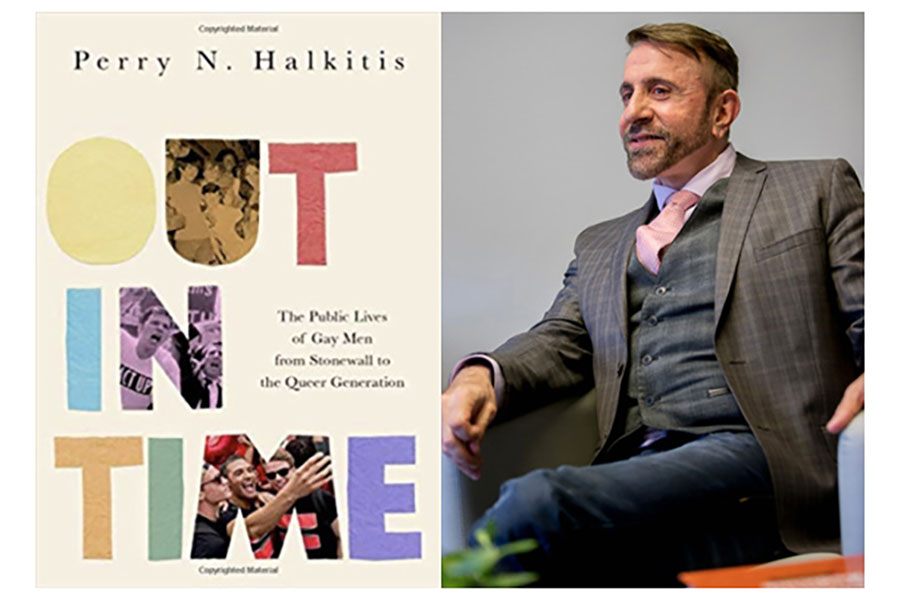A New Jersey statistician released a book that chronicles the lives of 15 gay men across three generations, evaluating the different hardships and similarities experienced among the age groups.
“Out in Time: The Public Lives of Gay Men from Stonewall to the Queer Generation,” written by Dr. Perry Halkitis, dean and biostatistics and urban-global public health professor at Rutgers University’s School of Public Health, was published June 3. The book examines a recent uptick in hate crimes against the LGBTQ community, racism in the queer population, and how toxic masculinity impacts gay men’s health, among other topics.
The book follows five baby boomers, which correlates to the Stonewall era; five of the “AIDS Generation,” or Generation X; and five millenials, or members of the “queer generation.” Each group is defined by a crisis, Halkitis said: escaping harassment and arrest during Stonewall, surviving the virus during the epidemic and coping with the poor state of the economy for millennials.
The book also notes that the crises compound, meaning the “queer generation” is navigating all three challenges. But across the generations, each experiences a common feeling of otherness, Halkitis said.
“When you’re five years old, you’re not seeing that there are gay people around you, you just feel different,” he added. “That feeling of otherness permeates every generation, and if unchecked and if made worse by family, and made worse by society, I think is the ultimate source of the psychological distress that gay men face and lesbians face and trans people face.”
The book was inspired by the notion that coming out and living as LGBTQ has become “a walk in the park,” which is an idea popularly portrayed in media, Halkitis told PGN. He was also personally motivated after his cousin’s son struggled to come out, despite his family having a history of being loving and supportive. The relatives even attended Halkitis’ own gay wedding.
“It said to me that: Here’s a young man who, on paper, if you do the algorithm, shouldn’t be struggling, but, in fact, he is,” he added.
Hate crimes in the U.S. rose by 17 percent during the first year of Trump’s presidency, according to data released by the FBI in November 2018 (though some of the uptick may stem from increased reporting). In 2018, instances of hate crimes rose by 9 percent in 30 U.S. cities, marking an increase for the fifth year in a row.
Trans women of color experience even greater risk of violence, Halkitis said, because of a triple-minority status that renders them “the most vulnerable of the vulnerable.” In 2018, at least 26 trans women were violently killed in the U.S., most of them being Black, according to the Human Rights Campaign. This year, at least 13 trans people, including Philadelphia’s own Tameka “Michelle” Washington, have been violently murdered — all Black trans women.
Additionally, LGBTQ advocacy organization GLAAD’s fifth-annual Accelerating Acceptance Index, released in June, found a significant decline in support for the LGBTQ community among those aged 18-34.
For Halkitis, these trends indicate “a new type of crisis” — one perpetuated, he says in his book, by a federal government that erodes LGBTQ liberties through actions like barring trans soldiers from serving in the military and allowing healthcare providers to restrict services based on their religious beliefs. Hate crimes began to increase around the time gay marriage was legalized in the country in 2015, he told PGN.
“It stirred a segment of the population in the United States that holds very traditional beliefs about marriage to really become even more adamant or vehement or emotional in their reaction,” Halkitis said. “It is then perpetuated in the last two years by an administration that villifies LGBTQ people or Brown people or women.”
Last weekend, gunfire ripped through a Walmart in El Paso, Texas, killing 22 people and injuring at least two dozen. The shooting is being investigated as a hate crime after police found a four-page anti-immigrant manifesto posted online by the shooter.
Less than 24 hours after the Aug. 3 incident in Texas, shots erupted in the downtown Oregon District of Dayton, Ohio. Nine people were killed.
Following the shootings, Halkitis said he hopes the nation has “hit a crescendo” with hate-inspired violence.
“In the 1980s, when everyone was dying around me, we didn’t stay quiet,” he said. “We demanded that the government do something to save our lives. This is not the time to be quiet, this is not the time to make people feel comfortable about their feelings. It’s time to push back.”
